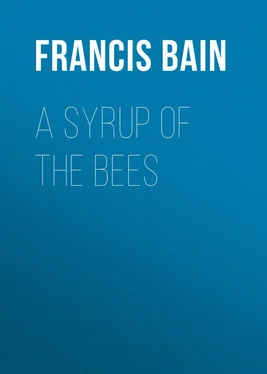Francis Bain - A Syrup of the Bees
Здесь есть возможность читать онлайн «Francis Bain - A Syrup of the Bees» — ознакомительный отрывок электронной книги совершенно бесплатно, а после прочтения отрывка купить полную версию. В некоторых случаях можно слушать аудио, скачать через торрент в формате fb2 и присутствует краткое содержание. ISBN: , Жанр: foreign_antique, foreign_prose, на английском языке. Описание произведения, (предисловие) а так же отзывы посетителей доступны на портале библиотеки ЛибКат.
- Название:A Syrup of the Bees
- Автор:
- Жанр:
- Год:неизвестен
- ISBN:http://www.gutenberg.org/ebooks/35928
- Рейтинг книги:3 / 5. Голосов: 1
-
Избранное:Добавить в избранное
- Отзывы:
-
Ваша оценка:
- 60
- 1
- 2
- 3
- 4
- 5
A Syrup of the Bees: краткое содержание, описание и аннотация
Предлагаем к чтению аннотацию, описание, краткое содержание или предисловие (зависит от того, что написал сам автор книги «A Syrup of the Bees»). Если вы не нашли необходимую информацию о книге — напишите в комментариях, мы постараемся отыскать её.
A Syrup of the Bees — читать онлайн ознакомительный отрывок
Ниже представлен текст книги, разбитый по страницам. Система сохранения места последней прочитанной страницы, позволяет с удобством читать онлайн бесплатно книгу «A Syrup of the Bees», без необходимости каждый раз заново искать на чём Вы остановились. Поставьте закладку, и сможете в любой момент перейти на страницу, на которой закончили чтение.
Интервал:
Закладка:
A Syrup of the Bees
And I rove on the breeze with the world of bees
like the shadow of a bee:
For a dead moonflower which the worms devour
is the tomb of the soul of me.
O the hum of the bees in the mango trees
it murmurs taboo! taboo!
Should a dead moonflower which the worms devour
smell sweet as the mangoes do?
What! shall I deem my flower a dream
when I do find, each morn,
Wet honey sips left on my lips,
and in my heart, a thorn?
PREFACE
The Young Barbarians, when Rome's ecclesiastical polity got hold of them, were persuaded by their anxious foster-mother to sell their Scandinavian birthright of imagination for an unintelligible, theopathic mess of mystic Græco-Syrian pottage. But the "demons," though driven generally from the field, lurked about in holes and corners, watching their opportunity. They took refuge in bypaths, leaving the high road: they lay in ambush in a thicket, whence nothing ever could dislodge them: that of fairy tales and fables.
In India, the "demons," i. e. the fairy tales and fables, have never had to hide. But the fairy tales of India differ from the fairy tales of England, much as their fairies do themselves. The fairies of Europe are children, little people: and it is to children that fairy stories are addressed. The child is the agent, as well as the appeal. In India it is otherwise: the fairy stories are addressed to the grown-up, and the fairies resemble their audience: they are grown up too. They form an intermediate, and so to say, irresponsible class of beings, half-way between the mortals and the gods. These last two are very serious things: they have their work to do: not so the fairies, who exist as it were for the sake of existence – "art for art's sake" – and have nothing to do but what people who have nothing to do always do do – to get themselves and other people into mischief. They are distinguished by three noteworthy characteristics. In the first place, they are possessors of the sciences, i.e. magic, and this it is which gives them their proper name ( Widyádhara ), 1 1 Some kindly critics of these stories have objected to the W, here or elsewhere. The answer to this is, that European scholars have taught everybody to pronounce everything wrong, by e. g. introducing into Sanskrit a letter that it does not contain. There is no V in Sanskrit, nor can any Hindoo, without special training, pronounce it: he says, for instance, walwe for valve .
which is almost equivalent to our wizard . Secondly, every Widyádhara can change his shape at will into anything he pleases: they are all shape-changers ( Kámarupa ). And finally, their element is air: they live in the air, and are thus denominated sky-goers, sky-roamers, air-wanderers , in innumerable synonyms. These are the peculiar attributes of the fairies of Ind.
Like many other persons in India (and out of it) who are far from being either fairies or wizards, they are extraordinarily touchy, and violently resentful of scorn or slight: things not nice to anybody, but the Wizards are not Christians, and generally take dire revenge. A very trifling provocation will set them in a flame. The Widyádharí lady is jealousy incarnate. Jealousy, be it noted, is a thing that many people much misunderstand. Ask anyone the question, where in literature is jealousy best illustrated, and ninety-nine people in a hundred will reply, Othello. But, as Pushkin excellently says, Othello is not naturally a jealous man at all: he is his exact antipodes, a confiding, unsuspicious nature. 2 2 This "detached reflection" of Russia's national poet is endorsed by Dostoyeffsky, the greatest master of jealousy that the world has ever seen.
Jealousy not only distrusts on evidence; it distrusts before evidence and without it; it anticipates evidence and condemns without a trial: it does not wait even for "trifles light as air," but constructs them for itself out of nonentity. Its essence is causeless and irrational suspicion. Your true jealous nature never trusts anything or anybody for an instant. Othello is of noble soul: no jealous man ever was or could be. With women, it is not quite the same; but even here, real nobility of character excludes the possibility of jealousy, because it trusts, until it is deceived, and then its glass is shattered, and its love gone beyond recall: sympathy is annihilated. Compare Mary Queen of Scots and Elizabeth: the one, the noblest, the other, the meanest creature that ever sat upon a throne. Mary trusted even Darnley till she discovered that he was beneath every sentiment but one: Good Queen Bess never trusted anyone at all. Mauvaise espèce de femme!
And so, they are not much to be depended on, these Wizards; anybody taking up with one of them, male or female, had better be careful. You can never tell where you are with them; their affection is unstable; they are fickle, as might be expected from creatures of the air: their feelings are as variable as their shapes. They can be just as hideously ugly as unimaginably beautiful. The stories that deal with them contain a moral entirely in harmony with all Indian ideas: it is a mistake not to stick to your own caste. When two of different castes are thrown together, the trouble inevitably begins. The gipsies, who came apparently from Sind, brought this notion into Europe, in a form not previously familiar to it. That difference of kind is insurmountable, is the fundamental axiom of Indian theory and practice. The owl to the owl, the crow to the crow: otherwise, Nemesis and catastrophe. A Syrup of the Bees 3 3 The title has a secondary meaning (with reference to its place in the series), she that is loaded with the nectar of Maheshwara, i.e. the moon that he wears.
is another instance.
Everywhere to-day we hear people singing a very different song: from all sides is dinned into our ears the cant of humanity, "our common humanity." In the meantime, men differ in many ways more than they agree, and the differences of humanity are practically far more vital than the common base. Just as, though all men have weight, yet gravitation simply by reason of its universality does not constitute an element of politics, and is altogether a negligible quantity, fact though it be, so is it with humanity: the generic identity is nothing, the peculiar distinctions all. The world is not like a plain, but an irregular region such as that of the Alps or Himalaya, consisting of inaccessible peaks that separate deep valleys, at the bottom of which live parcels of humanity drowned in thick fogs or mists of totally different colours and intensities, that distort and transmogrify everything they see: so that if here and there any single individual succeeds in climbing, by dint of toil or special circumstances, to the tops, where in the clear ether all the situation lies spread out in its truth before his eye, he will find that he has thereby only cut himself absolutely off from communion and sympathy, not only with the denizens of his own valley, but that of all the others too. From that moment he ceases to be intelligible to the rest. No reasoning of his can ever touch them, or succeed in opening their eyes, because their error is not one of reason, but of perception: they cannot, because they do not, see things as he sees them: the mists, 4 4 No mere learning will remove them. Pundits, as a rule, end where they began, "lost in the gloom of uninspired research."
with all their refraction and delusive transformation, are always there. Say what he will, he will not awake them: he will gain nothing in return for all his efforts but ridicule, abuse, or neglect. So Disraeli, in his generation, seemed to himself to be like one pouring, from a golden goblet, water upon sand. To be above the level of humanity is to be counted, till after you are dead, as one who is below.
Интервал:
Закладка:
Похожие книги на «A Syrup of the Bees»
Представляем Вашему вниманию похожие книги на «A Syrup of the Bees» списком для выбора. Мы отобрали схожую по названию и смыслу литературу в надежде предоставить читателям больше вариантов отыскать новые, интересные, ещё непрочитанные произведения.
Обсуждение, отзывы о книге «A Syrup of the Bees» и просто собственные мнения читателей. Оставьте ваши комментарии, напишите, что Вы думаете о произведении, его смысле или главных героях. Укажите что конкретно понравилось, а что нет, и почему Вы так считаете.












